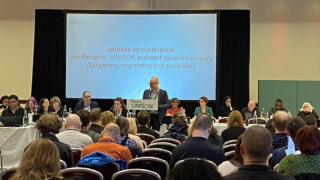Higher education unions have submitted a joint pay claim for 2017-18 to the national employers’ organisation, the Universities and Colleges Employers Association (UCEA).
The claim has been submitted by UNISON, UCU, Unite, GMB and EiS. This year’s joint higher education national pay claim is aimed at ensuring that everyone working in the sector, whatever their role, has a fair and decent pay uplift, improving their working lives.
Key points from the claim are:
- An increase to all spine points on the national pay scale of RPI plus £1,200, or RPI plus 3%, whichever is greater;
- £10 per hour minimum wage with all HEIs to become living wage employers, ensuring all campus staff are paid at least the Living Wage Foundation rate.
Full details of the claim can be downloaded here.
The unions believe that agreement on this claim would deliver improvements in staff morale and equalities that universities urgently need to tackle.
The claim has a number of other elements, addressing the continuing use of zero hours contracts, excessive workloads, eliminating the gender pay gap and establishing a Scottish sub-committee. The joint unions have expressed that they would consider a two-year pay offer that contains reference to both RPI – ‘keep up’ – and a ‘catch up’ element.
UNISON national officer Ruth Levin said: “Universities for a long time have relied on the goodwill of employees to work excessive hours and take on more work without increases in their pay.
“The joint unions are challenging universities to address pay that has significantly fallen behind inflation. This claim sets out the unions’ agenda to ensure that no one working for a university is paid below the living wage.”
She continued: “In addition there needs to be further work by the sector to address the problem of excessive workloads and hours of work, the gender pay gap, precarious working practices and the growing divergence between nations.”
The first pay negotiating meeting is scheduled to take place on 30 March 2017.




